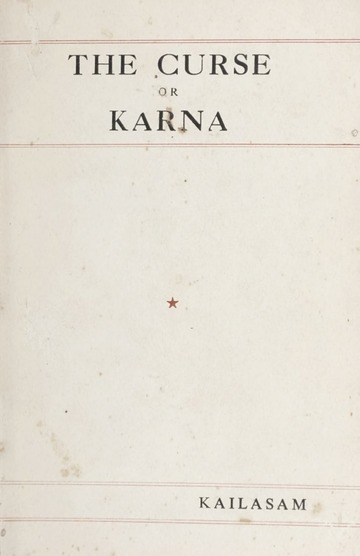Thanking Activities: The Curse Of Karna
Tyagaraja Paramasiva kailasam , popularly known as T. P. Kailasam was both a great playwright and a talented actor. His plays are lively representation of themes taken mostly from ancient Indian literature. Commenting upon it S. Krishna Bhatta observs :
It appears that his knowledge of ancient Indian literature and his long stay in England urged him to contribute something concrete to this sparsely cultivalted field. In spite of
The Curse of Karna
Interpret the 'End' of all acts and scenes.
Act - 1
Raama : POOR KARNA! POOR, POOR KARNA !
Act - 2
Gandharaj : POOR ANGA ! POOR POOR HONEST ANGA!
Act - 3
The King Suryodhan :THE KING POOR ANGA !OUR POOR GREAT ANGA !
Act - 4
Bheema : Ange crumples into Bheema's arms who carries him out muttering amid tears : POOR ANGA ! POOR GREAT ANGA !" THE THRONE ROOM, empty now, is exposed for a minute before -
Act - 5
Aswatthama : "OUR ANGA !" "OUR GREAT ANGA!"
"OUR POOR POOR ANGA!"
2. Is ' moral conflict' and 'Hamartia' there in Karna's character ?
Hamartia is the tragic flaw or error that reverses a protagonist’s fortune from good to bad. Hamartia, pronounced hah-mahr-tee--uh, is derived from the Greek phrase hamartanein meaning “to err” or “to miss the mark.” Hamartia includes character flaws such as excessive ambition, greed, or pride which result in tragic consequences.
Karna - The Voice of Subaltern
The story of Karna begins with the misfortune of his secret birth and unfolds itself amidst the unremitting gloom of injustice and insult. A long time ago, a beautiful young princess named Kunti lived with her Uncle, King Kuntibhoj, in a lovely palace along the banks of a wide river. One day Maharishi Durvasa visited the palace of Kuntibhoja. He stayed there for almost a year. During his stay Kunti was given the responsibility of attending to his needs. Kunti served the Maharishi with great reverence without caring for her own comfort. The sage had a very peaceful and happy stay and wanted to reward Kunti for her services. Maharishi said, “Child, one day you will need the help of the Gods. I am going to teach you a secret mantra for inviting the Gods into your life. Be very careful with this mantra! Use it wisely.” (Sperling, 5) Early the next morning Kunti was playing by herself in the royal garden. The sun had risen and Kunti watched its rays touched a flower here, a leaf there. She felt its warmth on her skin. She thought about the Sun God waking up the whole world. Forgetting her promise to Durvasa, she began to recite the mantra. She closed her eyes andconcentrated the way she had been taught to summon the Sun-God Surya who is compelled to give her a child, fearful that a child conceived before marriage may ruin her reputation, Kunti places the child-born with natural armour and divine earrings-in a wicker basket. She coated the basket with the wax to make it waterproof, and lined it with layers of the silk to make it soft and warm. She placed the baby carefully in his new bed and carried the basket to the river. Then she kissed him good-bye and set the basket afloat and whispered, “May the Sun-God watch over you always and keep you safe. May you find parents who will love you and care for you.” Downstream, Adhiratha was sitting on a rock, hoping to catch a fish for the midday meal. He was a gentleman,a charioteer by trade, and his wife Radha was a gentle and good woman. They were often sad, however, for they were unable to have children. Adhiratha cast the line out over the river and sighed again, he waded out into the current and caught hold of the basket.
Karna was lodgedin the section reserved for ordinary pupils and away from the section reserved for princes and other high caste students. After a few days when Adhiratha visited his son in his lodgings, he found him tense and somewhat angry as well. Before entering the room he had assured him that his son was very bright and a quick learner. But on entering the room he found him in a different frame of mind which made him apprehensive. On being asked, Karna started asking all sorts of questions with his father. He asked, “Baba is it a crime to be a Suta-Putra? Why do scriptures sanction this class-based discrimination? Why the princes and other so-calledupper-classstudents should be given better food, better lodgings,and better education as compared to students like me,who seem to have an inbornstigma attached to their names? Where does my fault lie in all this?” (Zutushi, 68) Similarly, this scenario is also denoted by the term ‘subaltern’conventionally denotes an inferior military rank, it is more generally used as ‘a name for the general attribute of subordination in South Asian society’ often expressed in terms of caste and gender as it is being acquired at birth and is non-changeable. The term ‘Subaltern’was coined by Ranjit Guhaand later it was adopted by Marxist Antonio Gramsciand further it was discussed by Gayatri Chakravorty Spivak in her essay ‘Can the Subaltern Speak?’People consider Subaltern as the unrepresented group of people in the society, people of inferior race, not fit for making any real contribution to the society and therefore they cannot speak, but in reality subaltern can speak but others do not have the patience to listen to them and same can be seen with Karna, he is capable but he ultimately he is Suta Putra.



No comments:
Post a Comment